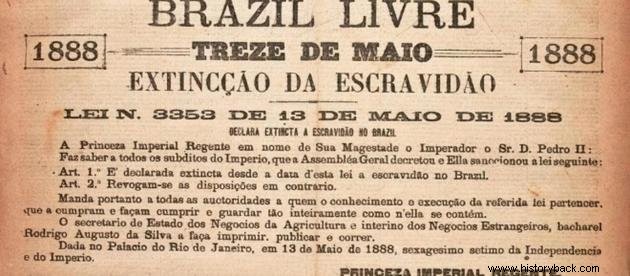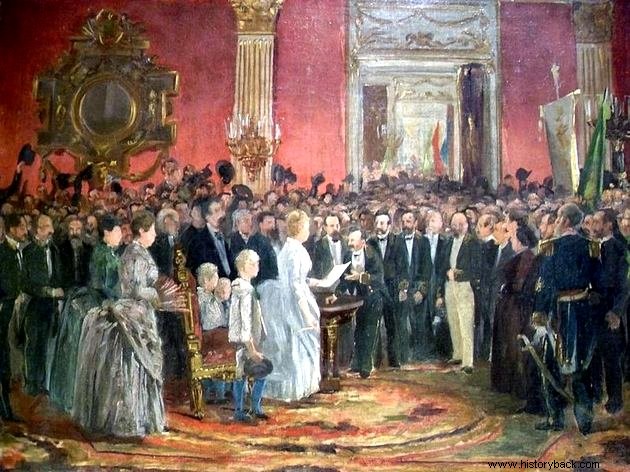The Golden Law (Law nº 3.353), was sanctioned by Princess Dona Isabel, daughter of Dom Pedro II, on May 13, 1888 .
The law granted total freedom to the slaves that still existed in Brazil, a little over 700 thousand, abolishing slavery in the country.
The sanction of this law resulted in a victory for the conservatives who abolished slavery without paying compensation to the farmers.
For the imperial family, it consisted of the loss of political support and for the slaves, freedom, albeit without social integration.

Abstract
For 300 years, that is, since the beginning of Portuguese colonization in America, the enslavement of human beings in Africa was an activity that brought great profits to the Portuguese.
The factories installed in Portuguese Africa practically only lived from this trade.
Slavery was to everyone's advantage as it was based on the forced and unpaid labor of blacks who were brought from Africa.
First, they were destined to extract the pau-brasil, then in the sugar mills, in the gold mines and in the coffee plantations. They also carried out domestic activities, built houses, bridges, churches and even carried out artistic works.
As can be seen, during the colonial period, all manual tasks were based on slave labor. This was bought by the landowners, who paid taxes to the metropolis.
At the end of the 19th century, however, the world was consolidating the industrial mode of production, where human strength was no longer essential.
The slave regime enters into decadence and several European countries declare slavery extinct in their countries. Later they would do it in their colonies.
Likewise, abolitionists, freed blacks, and the United Kingdom, the Imperial Family, pressure the Brazilian government to abolish slavery.
On May 13, 1888, the Senate met to discuss the abolition law that was passed. Immediately, the document was taken to the Palace of the City of Rio de Janeiro, where Princess Isabel, as regent of the empire, waited to sanction it.

Alongside senators, such as Manuel Pinto de Sousa Dantas (1831-1894), Senator Dantas, and other authorities of the Empire, the Regent signs the Lei Áurea (Law nº 3.353), which declares slavery in Brazil extinct.
The Law had only 2 articles:
It is said that the Baron of Cotegipe, upon receiving the signed law, would have said to Princess Isabel:"Your Imperial Highness, won the bet, redeemed a race, but lost the throne ".
Abolitionist Laws
Before the Lei Áurea, three laws focused on the extinction of slave labor in Brazil:
- Eusébio de Queirós Law :Law nº 581 that was enacted on September 4, 1850, by Minister Eusébio de Queirós (1812-1868). The aim was to end the slave trade, transported from Africa on slave ships.
- Law of the Free Womb :Law nº 2.040, is considered the first abolitionist law, enacted on September 28, 1871, by the Viscount of Rio Branco (1819-1880), in which it granted freedom, from that date on, to all children born in a slave womb.
- Law of Sexagenarians :Law nº 3.270, also called Saraiva-Cotegipe Law, was enacted on September 28, 1885, in the conservative government of Barão de Cotegipe (1815-1889), which provided for freedom for slaves over 60 years old.
It is worth remembering that Brazil was the last western country to abolish slavery.
See also:AbolitionismConsequences
With the signing of the Lei Áurea, the landowners withdrew their support for the Emperor. They did not agree that they would not receive any compensation for the freed slaves.
In this way, they started to support the republicans, who grew mainly in the ranks of the Army. A year and seven months later, the monarchy would be overthrown and the Imperial Family expelled from Brazil.
As for Princess Isabel, her popularity grew. She received from Pope Leo XIII (1810-1878), the Golden Rose, in recognition of her gesture for the abolition of slavery. Furthermore, her gesture remained in the memory of the freed blacks.
Until the 70's she was celebrated as the real responsible for the abolition of slavery in Brazil when her role began to be questioned. Currently, sectors of the black movement prefer to celebrate the 20th of November, the death of Zumbi, as a date of reflection.
As for the thousands of ex-slaves, they did not have many alternatives:either they continued to work on the farms, earning little or they left for the cities where they would carry out precarious activities.
European Immigration
The abolition of slavery represented an act of freedom, although the country was not prepared to absorb the freed slaves.
Although it had plans to integrate them into society, the imperial government did not have time to promote public policies aimed at blacks. With the republican coup of 1889, the new regime was not interested in promoting citizenship among the black population either.
From a "Eurocentric" view, that is, that Europe is the center of the world, farmers preferred the labor that arrived from Europe. They claimed that the black would not adapt to the salaried regime.
In this sense, it is worth mentioning that this so-called “Eurocentric” vision is a historical staleness that we carry for many centuries and we can say that it lasts until today.
We realize that many blacks and descendants suffer from racism in the country, lack of opportunities, and also make up the largest prison population in the country.
In addition, they have the lowest purchasing power, which is centralized in the hands of whites or European descendants.
See also:Abolition of Slavery in BrazilCuriosities
- The word “golden”, attributed to the law that ended slavery in Brazil, is a word that means “gold”, referring to the new “enlightened” period that emerged in the country.
- On May 17, an open-air mass was held in front of the Paço de São Cristóvão (currently the Quinta da Boa Vista Museum), in Rio de Janeiro, where the writer Machado de Assis was present.
- Coincidentally, the parliamentary debates lasted until May 13, the birth date of Dom João VI (1767-1826) of Portugal, great-grandfather of Princess Isabel. Therefore, May 13th is celebrated as the “Abolition of Slavery Day”.
Read more :
- Slavery in Brazil
- Black Brazilian Personalities
- Bill Aberdeen Act
- Proclamation of the Republic
